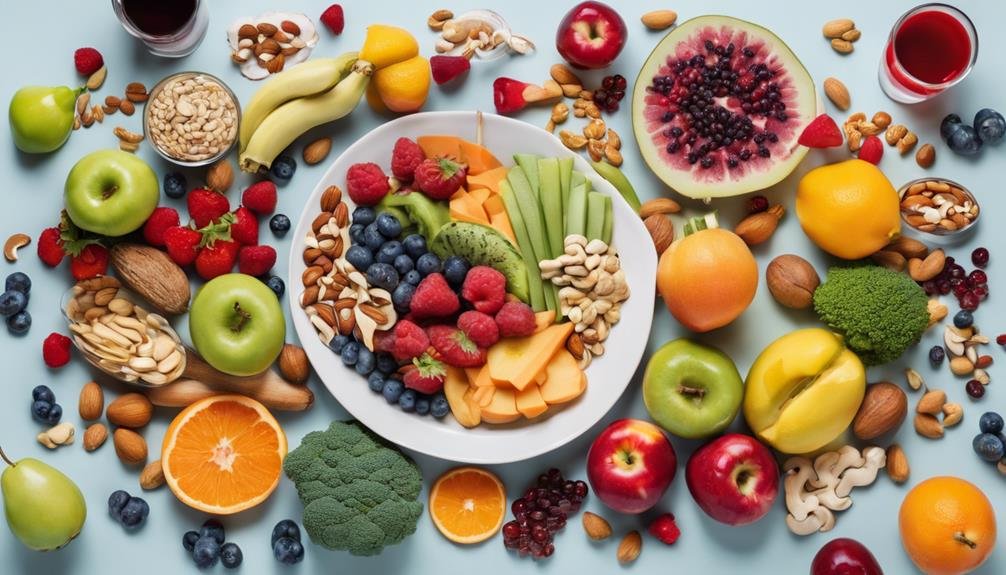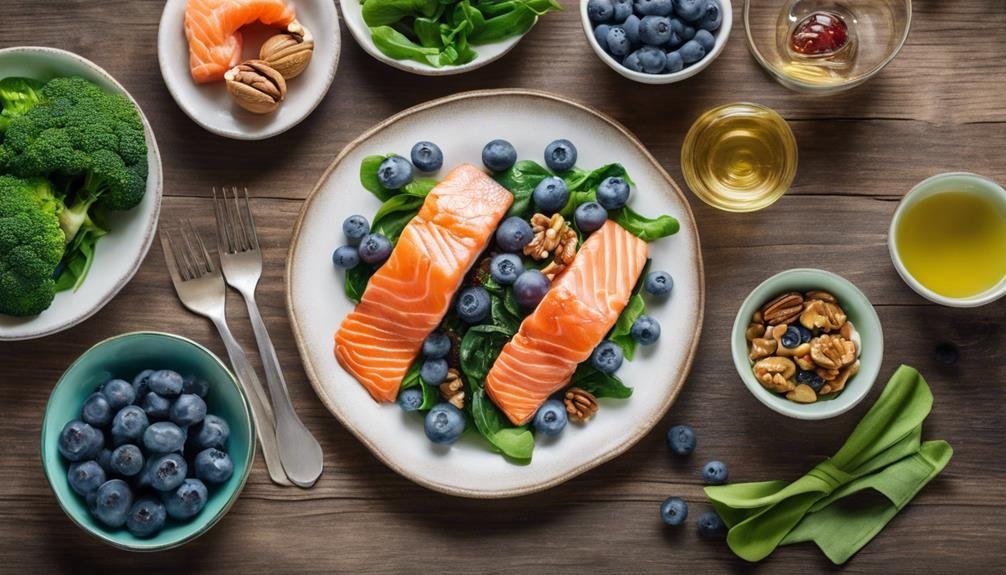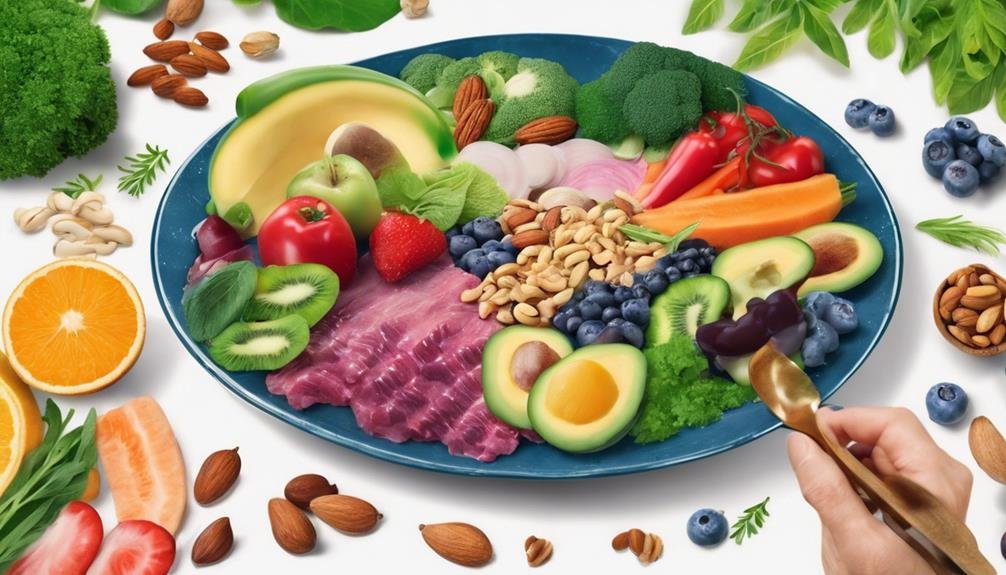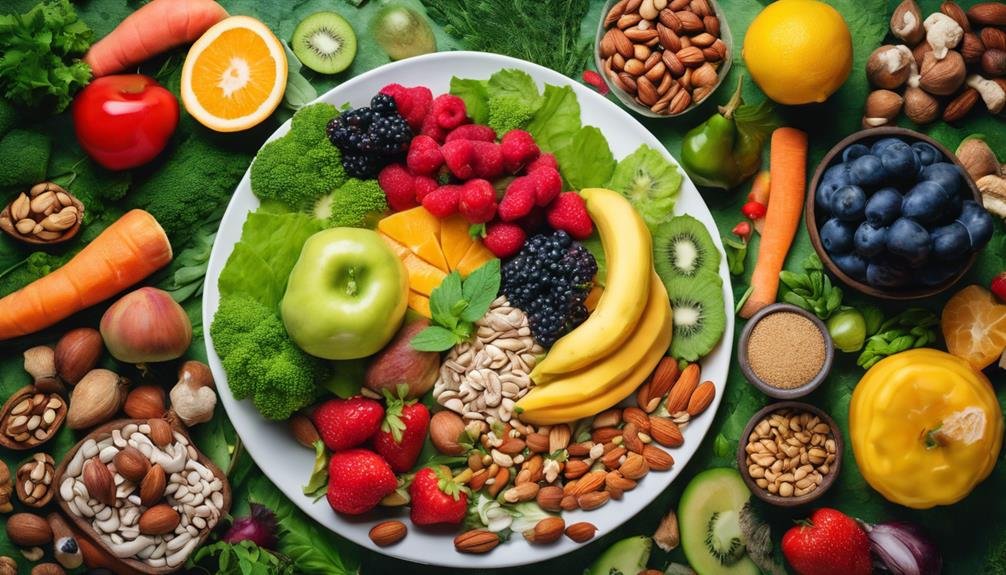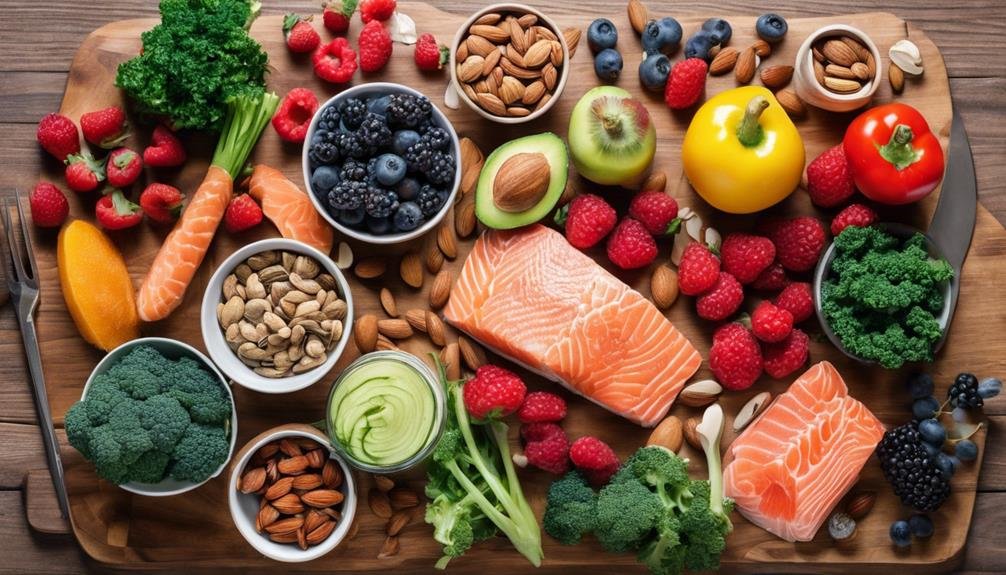You may be surprised to learn about the intriguing connections between the Paleo diet and its potential role in cancer prevention. The research delves into how this diet's anti-inflammatory properties, impact on insulin sensitivity, and effects on tumor growth could be significant factors in reducing the risk of developing cancer. These findings shed light on the multifaceted ways in which the Paleo diet may influence various processes related to cancer prevention. It's worth exploring how these mechanisms interact and contribute to the overall benefits of this dietary approach.
Anti-Inflammatory Properties of Paleo Diet
Researchers have found that the Paleo diet, characterized by its emphasis on whole foods and the avoidance of processed ingredients, showcases significant anti-inflammatory properties. Studies have shown that the Paleo diet's focus on fruits, vegetables, lean meats, nuts, and seeds can help reduce inflammation in the body. By excluding processed foods, refined sugars, and grains, individuals following the Paleo diet may experience a decrease in inflammatory markers, which are often associated with chronic diseases like cancer, heart disease, and diabetes.
The anti-inflammatory nature of the Paleo diet is thought to be attributed to the high intake of omega-3 fatty acids, antioxidants, and fiber-rich foods. These components work synergistically to combat inflammation and promote overall health. Additionally, the avoidance of processed foods containing harmful additives and preservatives further contributes to the diet's anti-inflammatory effects.
Incorporating the principles of the Paleo diet into your daily meal planning may help reduce inflammation in your body, potentially lowering your risk of developing chronic diseases associated with prolonged inflammation.
Impact on Insulin Sensitivity
The impact of the Paleo diet on insulin sensitivity is a significant area of interest in the realm of dietary research. Studies have shown that following a Paleo diet, rich in whole foods such as lean meats, fish, fruits, vegetables, nuts, and seeds, can improve insulin sensitivity. By eliminating processed foods, grains, and sugars, the Paleo diet helps regulate blood sugar levels and reduce insulin resistance. This is beneficial for individuals at risk of type 2 diabetes or those looking to manage their blood sugar levels more effectively.
Research indicates that the Paleo diet's emphasis on high-quality proteins and healthy fats can lead to better insulin sensitivity compared to traditional Western diets. Additionally, the avoidance of processed foods and added sugars helps prevent spikes in blood glucose levels, promoting overall metabolic health.
Incorporating the Paleo diet into your lifestyle may support better insulin regulation and reduce the risk of insulin resistance-related conditions. Remember to consult with a healthcare provider or nutritionist before making significant dietary changes.
Role in Reducing Oxidative Stress
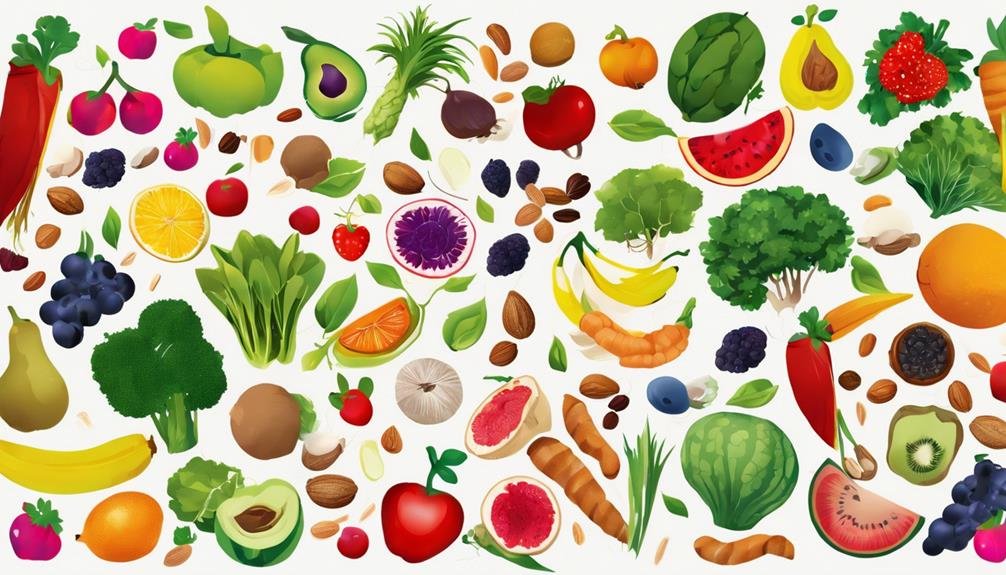
Playing a crucial role in promoting overall health, the Paleo diet has garnered attention for its potential in reducing oxidative stress.
Oxidative stress occurs when there's an imbalance between free radicals and antioxidants in the body, leading to cell and tissue damage.
Research suggests that the Paleo diet, rich in fruits, vegetables, nuts, and seeds, provides a high intake of antioxidants such as vitamins C and E, selenium, and phytonutrients.
These antioxidants help combat free radicals, reducing oxidative stress levels.
Potential for Enhancing Immune Function
With its nutrient-dense composition, the Paleo diet shows promise in potentially enhancing immune function. Research indicates that the diet's emphasis on whole foods rich in vitamins, minerals, and antioxidants may support a robust immune response. Nutrients like vitamin C, zinc, and selenium found abundantly in fruits, vegetables, nuts, and seeds play crucial roles in immune cell function and help protect against infections. Additionally, the Paleo diet's avoidance of processed foods and added sugars may reduce inflammation, which can further bolster immune health.
Studies have suggested that following a Paleo diet may lead to a more balanced gut microbiome, positively impacting immune function. The gut plays a significant role in regulating immune responses, and a diverse microbiome can enhance the body's ability to fight off pathogens. By promoting a healthy gut environment through the consumption of fiber-rich foods like fruits and vegetables, the Paleo diet may contribute to overall immune system enhancement.
Further research is needed to fully understand the extent of the diet's impact on immune function, but current evidence is promising.
Effects on Tumor Growth
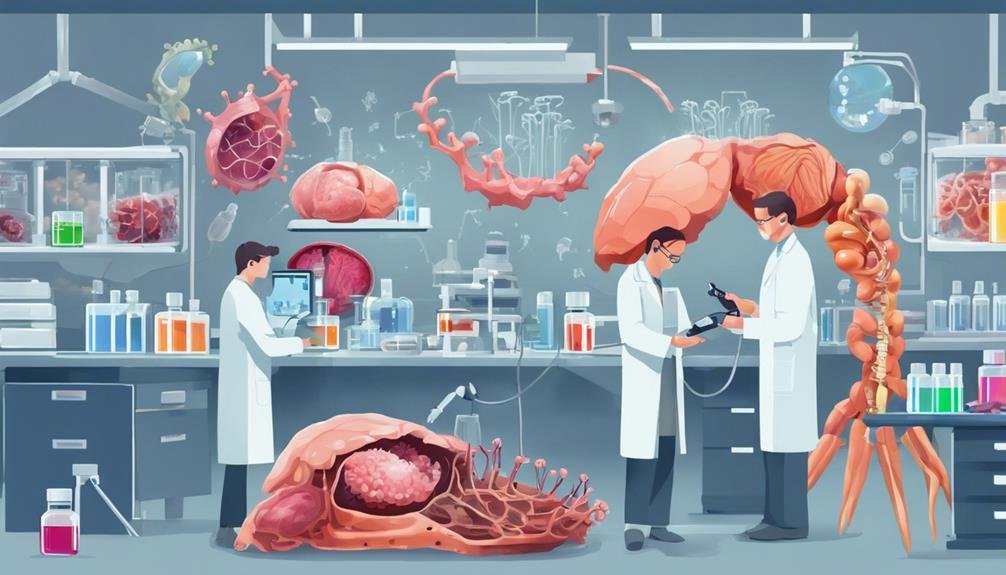
Exploring the impact of the Paleo diet on tumor growth reveals intriguing insights into its potential role in cancer prevention.
Studies have shown that the Paleo diet may have beneficial effects on tumor growth through various mechanisms:
- Decreased Inflammation: The anti-inflammatory properties of the Paleo diet, rich in fruits, vegetables, and healthy fats, may help reduce inflammation in the body, creating an environment less conducive to tumor development.
- Improved Insulin Sensitivity: By eliminating processed foods and refined sugars, the Paleo diet can improve insulin sensitivity. Lower insulin levels may decrease the risk of cancer, as insulin is a growth factor for tumors.
- Enhanced Nutrient Density: The emphasis on whole foods in the Paleo diet provides essential nutrients and antioxidants that support overall health. These nutrients may help optimize cellular function, potentially hindering tumor growth.
These findings suggest that adopting a Paleo diet could be a valuable component in a comprehensive approach to cancer prevention.
Relationship to DNA Damage Prevention
Investigating the potential effects of the Paleo diet on DNA damage prevention unveils a critical aspect of its impact on cancer risk. Studies suggest that the Paleo diet, rich in antioxidants, vitamins, and minerals from whole foods like fruits, vegetables, nuts, and seeds, may play a role in reducing DNA damage. Oxidative stress, caused by free radicals, can harm DNA and lead to mutations that contribute to cancer development. By consuming foods abundant in antioxidants, such as vitamin C, E, and selenium, the body may better defend against oxidative stress and subsequent DNA damage.
Furthermore, the Paleo diet's emphasis on reducing processed foods and sugars could also positively impact DNA integrity. These dietary choices may help in maintaining the body's repair mechanisms, crucial for fixing DNA damage before it leads to cancerous changes.
As DNA damage is a fundamental step in cancer initiation, the potential of the Paleo diet to mitigate this process highlights its possible role in cancer prevention.
Influence on Hormone Regulation
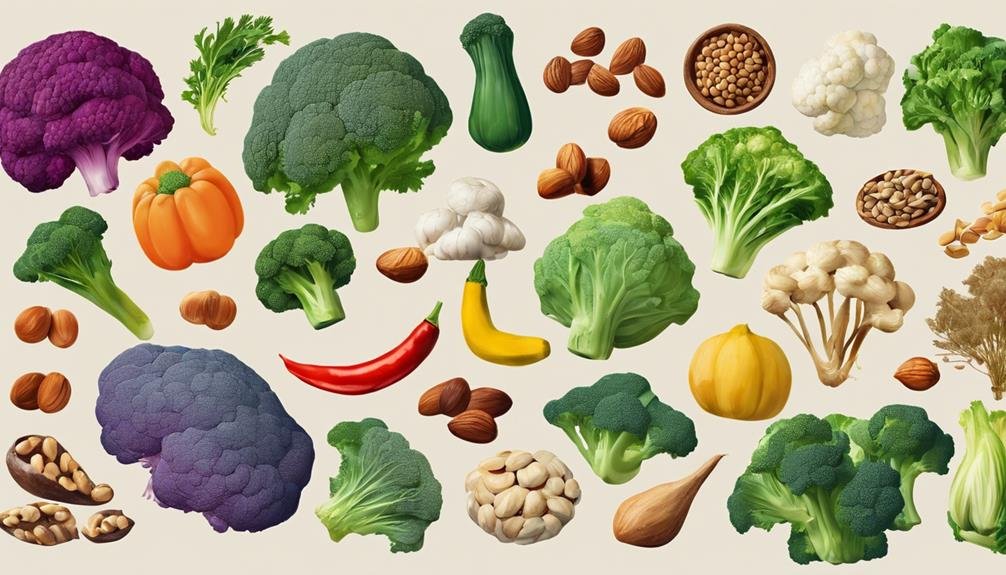
A significant aspect of the Paleo diet's impact on cancer prevention lies in its potential influence on hormone regulation. This dietary approach may affect hormone levels, which play a crucial role in cancer development and progression. Research suggests that the Paleo diet can modulate hormone regulation in ways that may reduce cancer risk. Here are some key points to consider:
- Balanced Insulin Levels: The Paleo diet promotes stable blood sugar levels, which can help regulate insulin production and sensitivity. This is important as high insulin levels have been linked to an increased risk of certain cancers.
- Improved Estrogen Metabolism: Some studies indicate that the Paleo diet may support healthy estrogen metabolism, potentially reducing the risk of hormone-related cancers like breast and prostate cancer.
- Reduced Inflammation: By emphasizing whole foods and eliminating processed items, the Paleo diet can help reduce inflammation in the body. Chronic inflammation is a known risk factor for cancer development.
These factors underscore the potential of the Paleo diet in influencing hormone regulation and contributing to cancer prevention efforts.
Connection to Gut Health
The Paleo diet's impact on cancer prevention extends to its potential connection to gut health. Research suggests that a diet rich in whole foods, lean proteins, fruits, and vegetables, as promoted by the Paleo diet, can positively influence gut health. A healthy gut plays a crucial role in cancer prevention by supporting the immune system, reducing inflammation, and aiding in proper digestion and nutrient absorption. The Paleo diet's emphasis on eliminating processed foods and sugars can contribute to a healthier gut microbiome, which is essential for overall well-being and disease prevention.
Studies have shown that a balanced gut microbiome can help regulate hormones, improve metabolism, and reduce the risk of various cancers. By promoting a diverse array of beneficial bacteria in the gut, the Paleo diet may create an environment that's less conducive to cancer development.
Incorporating probiotic-rich foods like fermented vegetables and yogurt, as well as prebiotic foods like garlic and onions, can further enhance gut health and potentially lower cancer risk.
Impact on Cancer Cell Metabolism
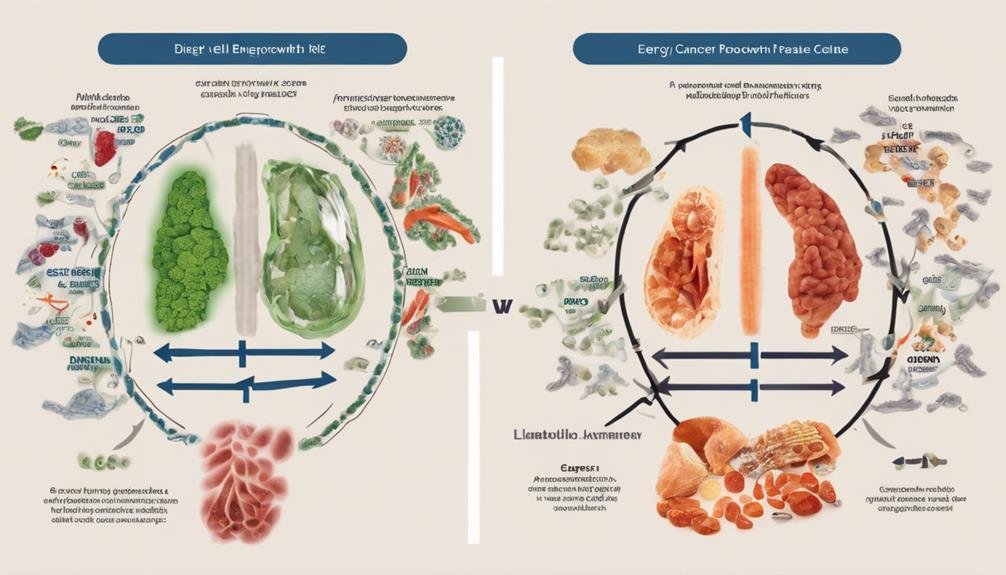
With a focus on the impact of diet on cancer cell metabolism, researchers have delved into how the Paleo diet influences the metabolic pathways within cancer cells. The Paleo diet, rich in whole foods and devoid of processed sugars and grains, has shown promising effects on cancer cell metabolism. Here are some key findings:
- Increased Autophagy: The Paleo diet has been linked to an increase in autophagy, a cellular process that clears out damaged components within cells, potentially inhibiting the growth of cancer cells.
- Altered Glucose Metabolism: Studies suggest that the Paleo diet may lead to a decrease in glucose metabolism within cancer cells, which is crucial since cancer cells often rely heavily on glucose for their energy needs.
- Enhanced Mitochondrial Function: Research indicates that the Paleo diet can enhance mitochondrial function in cells, promoting efficient energy production and potentially reducing the proliferation of cancer cells.
These findings highlight the intricate relationship between diet and cancer cell metabolism, underscoring the importance of dietary choices in cancer prevention strategies.
Potential for Reducing Inflammation Markers
Amidst the exploration of the Paleo diet's impact on cancer prevention, attention has turned to its potential for reducing inflammation markers. Studies suggest that the Paleo diet, rich in fruits, vegetables, lean meats, nuts, and seeds, may help reduce inflammation in the body. Chronic inflammation is linked to the development of various diseases, including cancer. By following a Paleo diet, individuals may benefit from lower levels of inflammatory markers such as C-reactive protein (CRP) and interleukin-6 (IL-6).
Research has shown that the foods included in the Paleo diet, such as omega-3 fatty acids from fish, antioxidants from fruits and vegetables, and healthy fats from nuts and seeds, can help modulate the body's inflammatory response. These components work synergistically to combat inflammation and promote overall health. By adopting a Paleo diet, individuals may potentially lower their risk of chronic inflammation-related diseases, including certain types of cancer.
Incorporating anti-inflammatory foods into your diet is a proactive step towards supporting your body's natural defense mechanisms and promoting overall well-being. Consider including more Paleo-friendly foods in your meals to help reduce inflammation markers and potentially lower your risk of developing inflammatory-related conditions.
Effects on Angiogenesis
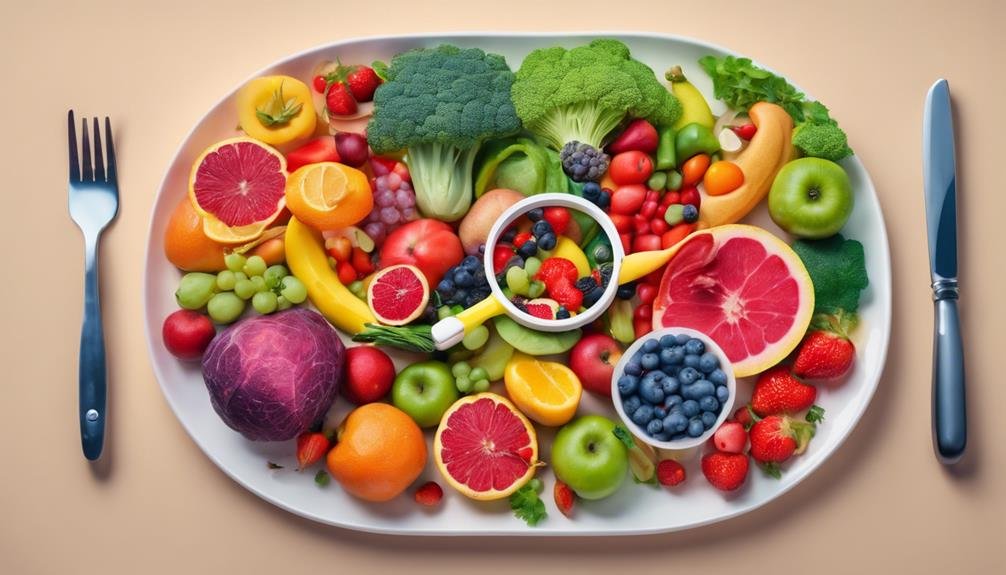
Recent studies have shed light on the potential effects of the Paleo diet on angiogenesis, the process by which new blood vessels form from pre-existing vessels. The Paleo diet, rich in anti-inflammatory foods, has shown promise in influencing angiogenesis, a crucial process in cancer development and progression.
- The consumption of whole foods in the Paleo diet provides essential nutrients and bioactive compounds that may regulate angiogenesis pathways.
- High intake of fruits and vegetables in the Paleo diet can contribute to anti-angiogenic effects through the abundance of phytochemicals and antioxidants.
- Omega-3 fatty acids found in fish, nuts, and seeds in the Paleo diet have been linked to decreased angiogenesis markers in some studies.
These findings suggest that adhering to a Paleo diet may offer benefits in modulating angiogenesis, potentially impacting cancer prevention strategies. Further research is needed to elucidate the specific mechanisms by which the Paleo diet influences angiogenesis and its role in cancer prevention.
Role in Promoting Apoptosis
Studies exploring the effects of the Paleo diet have extended beyond angiogenesis to investigate its potential role in promoting apoptosis, the programmed cell death crucial for maintaining tissue homeostasis. Apoptosis plays a significant role in preventing the growth and spread of cancer cells by eliminating damaged or abnormal cells.
Research suggests that the Paleo diet, rich in whole foods like lean meats, fruits, vegetables, nuts, and seeds, may support the apoptosis process through various mechanisms. For example, certain components of the diet, such as omega-3 fatty acids found in fish and nuts, have been linked to promoting apoptosis in cancer cells. Additionally, the low intake of processed foods and sugars in the Paleo diet may help reduce inflammation, a key factor in cancer development, thus potentially enhancing apoptosis.
Further studies are needed to fully understand the specific ways in which the Paleo diet influences apoptosis and its implications for cancer prevention.
Frequently Asked Questions
Can the Paleo Diet Prevent Cancer Recurrence?
Yes, the paleo diet can potentially aid in preventing cancer recurrence. By focusing on whole foods, lean proteins, fruits, and vegetables while eliminating processed foods and sugars, the paleo diet promotes a healthy immune system and reduces inflammation, which are crucial factors in cancer prevention. However, individual results may vary, and it's essential to consult with healthcare professionals for personalized advice and treatment plans.
Does the Paleo Diet Affect Chemotherapy Effectiveness?
The Paleo diet's impact on chemotherapy effectiveness depends on individual factors. Research suggests that consuming whole foods rich in nutrients can support overall health during treatment. However, some components of the diet, like high protein intake, may interact with certain chemotherapy drugs. Consult with your healthcare provider to ensure that your dietary choices align with your treatment plan for optimal results.
Is the Paleo Diet Recommended During Cancer Treatment?
During cancer treatment, the paleo diet isn't universally recommended. Consult your healthcare provider for personalized advice. While some aspects of the paleo diet may offer benefits, such as reducing processed foods, it may lack certain nutrients crucial during treatment.
Staying well-nourished is vital, so focus on a balanced diet that meets your specific needs. Make informed choices to support your health and well-being throughout your cancer journey.
How Does the Paleo Diet Impact Cancer Survival Rates?
The impact of the paleo diet on cancer survival rates is a topic of ongoing research. Studies suggest that following a paleo diet rich in whole foods, lean proteins, and vegetables may positively influence cancer outcomes. However, more extensive clinical trials are needed to establish a definitive link between the paleo diet and improved survival rates.
It's essential to consult with healthcare professionals before making dietary changes during cancer treatment for personalized guidance.
Are There Specific Paleo Diet Recommendations for Different Cancer Types?
For different cancer types, specific paleo diet recommendations may vary. It's essential to consult with healthcare professionals and nutritionists to tailor dietary choices to your individual needs.
Some general guidelines suggest focusing on whole foods, lean proteins, and plenty of fruits and vegetables. Limiting processed foods, sugars, and unhealthy fats can also support overall health and potentially aid in cancer prevention.
Always prioritize a balanced diet and lifestyle in conjunction with medical advice.
Conclusion
In conclusion, the Paleo diet's research-backed benefits in cancer prevention are undeniable. It acts as a powerful shield against tumor growth, inflammation, and oxidative stress while boosting immune function and insulin sensitivity. Like a well-tuned machine, the Paleo diet optimizes cancer cell metabolism, inhibits angiogenesis, and promotes apoptosis. Embracing this dietary approach could be a key strategy in reducing the risk of developing cancer and supporting overall health.

